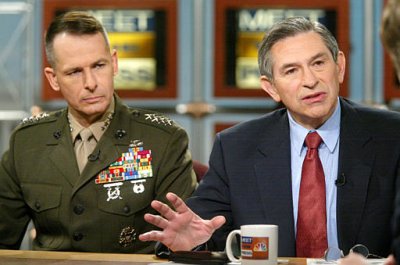"It's not a model we want to follow, of a sort of permanent international administration," Wolfowitz told CBS "Face the Nation." "We learned a lot in the Balkan situation, where the U.N. suddenly moved in," added Senate Armed Services Chairman John Warner, R-Va., on ABC's "This Week." "And here we are 12 years later, still struggling to try and put those pieces back together. We've learned from those experiences, and we're not going to repeat them in the aftermath of this conflict." The U.S.-led coalition will likely run the country until a new Iraqi government is in place and ready to take control of its affairs, Wolfowitz said. "I think the right goal is to move as quickly as we can ... to a government that is - if I could paraphrase Abraham Lincoln - of the Iraqis, by the Iraqis, for the Iraqis," he said. "Not to make them a colonial administration or a U.N. administration, or run in any way by foreigners." The coalition eventually will turn over complete power to the Iraqis, and allow them to choose their next leaders and government, he said. "You can't talk about democracy and then turn around and say we're going to pick the leaders of this democratic country," Wolfowitz said. "If it looks like it's imposed by us, if it looks like we sat down, hand-picked the leaders, put them in place, it will not have any legitimacy with the Iraqi people," said Sen. Joseph Biden of Delaware, the top Democrat on the Senate Foreign Relations Committee, on "This Week." But the U.S.-led coalition will stay in Iraq until officials are sure that the basic needs of the Iraqis like water, food and medicine can be met, he said. "We'd like it as quickly as possible to be done by Iraqis," he said. "But we want to make sure it's being done, and we'll do it until we're sure they can do it." "But the other part of in charge is determining the constitution of Iraq and how elections should be held and who the leaders should be," he added. "And we're not in charge of that. No foreigners can be in charge of that. That has got to be a process that involves Iraqis." Any interim Iraqi government should be made up of both Iraqis who left the country because of Saddam Hussein and those who stayed and suffered under his regime, officials said. "We're trying to put together a meld of the two to perform a transition government until the Iraqi people, exercising the fundamentals of democracy, can elect their own government," Warner said. The U.S. also will not keep permanent control of the Iraqi oil fields, although it probably will be the United States' responsibility initially because we're the most capable, Biden said. "We're there not to stay, to control it in the sense we're going to seize their oil for our profits," added Warner. "It's going back to the people of Iraq. We're there simply to maintain the security, provide for the infrastructure ... until the Iraqi people can have their own elections."
|
